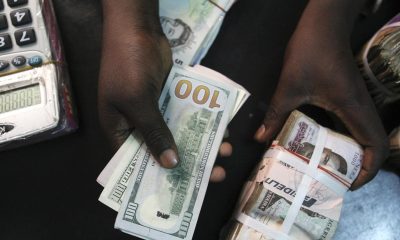Dollar to Naira Exchange Rates
Black Market Dollar To Naira Exchange Rate Today 22nd January 2023

What is the Dollar to Naira Exchange rate at the black market also known as the parallel market (Aboki fx)? See the black market Dollar to Naira exchange rate for 21st January, below. You can swap your dollar for Naira at these rates.
How much is a dollar to naira today in the black market?
Dollar to naira exchange rate today black market (Aboki dollar rate):
The exchange rate for a dollar to naira at Lagos Parallel Market (Black Market) players buy a dollar for N745 and sell at N753 on Saturday 21st January 2023, according to sources at Bureau De Change (BDC).
Please note that the Central Bank of Nigeria (CBN) does not recognize the parallel market (black market), as it has directed individuals who want to engage in Forex to approach their respective banks.
Dollar to Naira Black Market Rate Today
| Dollar to Naira (USD to NGN) | Black Market Exchange Rate Today |
| Buying Rate | N745 |
| Selling Rate | N753 |
Please note that the rates you buy or sell forex may be different from what is captured in this article because prices vary.
FG To Begin Gradual Petrol Subsidy Removal In April – Minister Confirms
President Muhammadu Buhari’s government has announced it will begin the gradual removal of the petrol subsidy in the second quarter of 2023.
The Minister of Finance, Budget and National Planning, Zainab Ahmed, revealed this in her report, highlighting the sidelines of the World Economic Forum in Davos, Switzerland.
Naija News understands that the federal government’s initial plan was to commence the subsidy removal in June following an 18-months extension. Ahmed noted that the petrol subsidy removal will now begin April 2023, about three months ahead of the initial plan to effect a complete stop to the expenditure head.
According to her, subsidy removal appears to be the position of all presidential candidates seeking to succeed the incumbent government.
She stated: “What will be safer is for the current administration to, maybe at the beginning of the second quarter, start removing the fuel subsidy, because it’s more expedient if you remove it gradually than to wait and move it all in one big swoop”.
The government had budgeted an expenditure of N3.35 trillion on petrol subsidies for January through June 2023, but the development had generated widespread debate on the expediency of such expenditure as it will increase the budget deficit of the FG, which would be financed through additional borrowing and hence the further rise in the nation’s public debt which stood at N44.06 trillion as at the end of September 2022.
According to the World Bank and the International Monetary Fund (IMF), removing fuel subsidies is one of the fiscal reforms urgently needed to lift Nigeria’s development outcomes, which are severely constrained by the inefficient use of resources.
Earlier in his remark, World Bank President, David Malpass, said: “Nigeria’s government urgently needs to strengthen fiscal management, create a unified, stable market-based exchange rate, phase out its costly, regressive fuel subsidy and rationalize preferential trade restrictions and tax exemptions.”
Malpass noted this while commenting on a World Bank report launched in November last year, titled: “Nigeria Public Finance Review: Fiscal Adjustment for Better and Sustained Results,”


